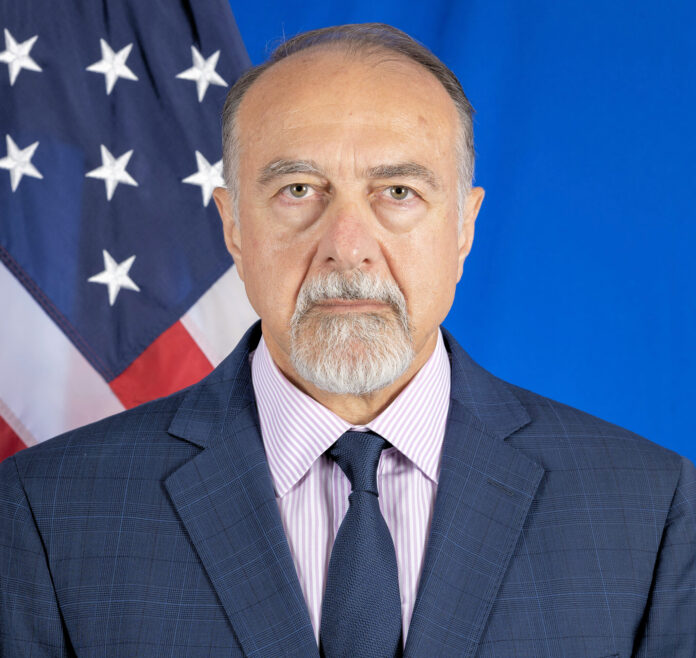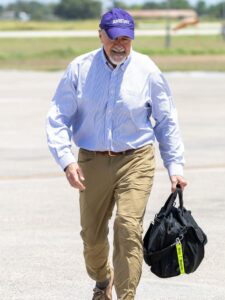
(Français)
The United States government appointed career diplomat Henry Wooster as its new Chargé d’Affaires to Haiti on May 30, 2025. He took the reins of the U.S. Embassy on Jun. 12 from Dennis B. Hankins, who retired from the U.S. State Department (DoS) after 40 years of service. He was in the post for just over one year, since March 2024.
Wooster is something of an upgrade from Hankins, who had been previously a U.S. Ambassador to Guinea and Mali in Africa.
Wooster, on the other hand, is coming to Haiti after acting as Principal Deputy Assistant Secretary in the Bureau of Near Eastern Affairs and, before that, as the Ambassador to Jordan from 2020 to 2023. Other weighty foreign service posts he has held are Political Counselor in Islamabad, Pakistan, Director for Central Asia at the National Security Council, and Foreign Policy Advisor to the Commanding General of the U.S. Joint Special Operations Command. He is a U.S. Army veteran.
Born and partially raised in a small town in Maine, Wooster had an Assyrian mother, who lived in both Turkey and the Soviet Union, and a father who was a U.S. Army officer and helped to train the soldiers of the Shah of Iran before his fall in 1979.

After growing up in Maine and Iran, Wooster went to a prep school and ended up at the elite U.S. colleges of Amherst and Yale, before entering the State Department.
He has spent most of his years in the Middle East and is highly knowledgeable about Iran, Iraq, Syria, Egypt, Tunisia, and, of course, Jordan, among other nations in the region.
Early in his diplomatic career, Wooster was posted as a Consul in Port-au-Prince, so he’s familiar with the country, and he speaks French fluently.
In his presentation of the new Chargé d’Affaires, U.S. Secretary of State Marco Rubio stated that Wooster “has been charged with leading a whole-of-government approach to U.S. policy on Haiti,” which means that he will be expected to coordinate the work of multiple U.S. agencies (DoS, Pentagon, aid agencies, etc.). “He will work with our partners across the globe, who are providing critical support to Haitian security forces,” a reference to the Kenyan, Salvadorean, and Guatemalan police officers who are part of the U.S.-funded Multinational Security Support Mission (MSS).
Wooster is a smooth talker, as can be seen in the question-and-answer presentation he gave on May 13 at the elite Ivy League college Dartmouth in New Hampshire. Although the discussion there revolved mostly around the Middle East, some of the answers he gave suggest why Rubio said that “he is the right person to lead this mission at a critical time.”
First, his experience as the Deputy Assistant Secretary of State for the Maghreb and Egypt (just before he became Ambassador to Jordan) means that Wooster has had some experience in dealing with emergent anti-imperialist movements, particularly in the Sahel. One student asked him about Tunisia.
“We have maintained strong and very positive relations with [Tunisia’s] military,” Wooster said. “They have continued to be great partners in the Sahel and in other areas and on missions and issues vital… certainly to the interests of the United States with any number of malefactors operating in the Sahel,” a clear reference to the anti-imperialist governments in Niger, Mali, and Burkina Faso.
The State Department is surely aware that Jimmy “Barbecue” Cherizier, principal leader and spokesman of the Viv Ansanm (Let’s Live Together) party and armed neighborhood group coalition, views Burkina Faso’s leader Ibrahim Traore as some kind of model, so Wooster’s background in fighting “malefactors” like the Alliance of Sahel States (AES) will be important.
Furthermore, in the Middle East, Wooster has had experience battling what the DoS calls “FTOs” or Foreign Terrorist Organizations, a label they have just hung on Viv Ansanm.
For example, regarding the Palestinian party Hamas, Wooster took the exact same position as the genocidal Zionist entity, Israel.

“What cannot, cannot, cannot be is that we cannot continue to have Hamas inside of Gaza… nor to be in the governance… That’s the paramount issue right now,” he said. “Hamas… cannot remain in power, in control, … Certainly, from the U.S. perspective and for our policy, it’s a what we call an FTO, a foreign terrorist organization, so that means we have formally designated this group as a terrorist organization so that puts them – you don’t want to be in that category, right ? – that’s the non-friend end of the ledger… They cannot continue to remain inside of Gaza.”
So in part, he may be appointed to deal with Washington’s latest “non-friend” FTO: Viv Ansanm.
Lastly, he understands the military and diplomatic elements in managing the U.S. Empire, so that will make him adept at leading a “whole-of-government” policy in Haiti, much as the Global Fragility Act (GFA) is planned to do, even though the USAID pillar of that program has been dismantled by Trump, or integrated into the DoS.
But Wooster explained to the Dartmouth students that, even with a “disruptive” presidency, like that of Trump, the U.S. empire maintains “constant” goals.
Under different presidents (he has worked under about five), “U.S. policies will shift in any number of directions, sometimes dramatically and sometimes imperceptibl[y]… but, throughout this, U.S. objectives and certainly the mission of the Department of State and of U.S. diplomacy remain fairly constant,” Wooster said. “ We communicate [that] when we sit down inside the drawing rooms or the homes… with foreign partners, government [leaders], people not in government, opinion shapers,… students, intellectuals: …. U.S. interests… remain constant.”
Berthony Dupont’s editorial of three weeks ago is correct: U.S. imperialism has temporarily succeeded in disorganizing social, economic, and political life in Haiti so that a revolutionary vanguard has not yet been able to emerge and create the subjective conditions for a revolution despite Haiti’s rotting economic, social, political, and security situation.
It will be the turn of the Organization of American States (OAS) to attempt a policy of “national reconciliation” in the coming days, because the bourgeoisie’s and government’s funding and arming of “brigades” to act as police attachés in fighting the armed groups of the working-class neighborhoods formed as Viv Ansanm has failed miserably despite the deployment of the MSS mercenaries and now Erik Prince’s BlackWater and the use of Kamikaze drones.
But the Haitian people are resilient; they will one day awaken to punish all their enemies; and their reaction will be proportionate to the violence they have suffered from their oppressors. Then they will take their destiny into their own hands and forever eradicate the exploitative, slave-capitalist system to build a new socialist society in Haiti.
No ambassador and no foreign force can resolve Haiti’s crisis; only the organized and conscientious popular masses can reverse the situation.
Henry Wooster’s arrival and this cosmetic change in U.S. diplomacy in Haiti will achieve nothing. The class struggle in Haiti has already progressed too far to be turned back.
Progressives will take note and denounce all the sellouts and collaborators of Western imperialism. We will never stop denouncing traitors, collaborators, armchair slaves, and the corrupt, who undermine the advance of Haiti’s popular struggle.










[…] New U.S. Ambassador to Haiti Signals Washington’s Alarm Over the Worsening Situation There Haiti Liberte […]
[…] (Anglais) […]
[…] (English) […]